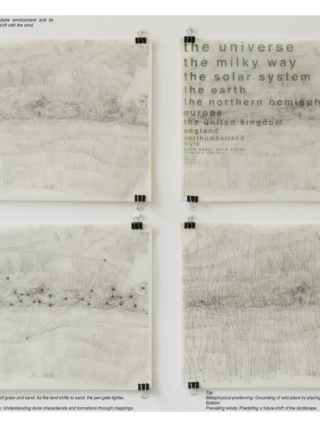Winners of the 187th round of President’s Medals have been announced, with winning projects championing an architecture of care and ecological consciousness.
Now in its 187th iteration, the RIBA President’s Medals reward the best student work from across the country. This year’s winners were announced on Thursday 14th December 2023 at RIBA’s 66 Portland Place in London, presented by president Muyiwa Oki, who awarded prizes for the Silver and Bronze Medals, along with RIBA Awards for Sustainable Design, and the Serjeant Awards for Excellence in Architectural Drawing.
According to the jury, this year’s winners the recipients of this year’s awards indicate a lasting change in the focus of student projects, prioritising “useful” architecture. The 2023 Silver Medal was granted to a project centred around supportive housing for individuals with young-onset Alzheimer’s and their families, a project resonates with the theme of the Stirling Prize winner for this year, the John Morden Centre, a residential daycare facility in London.
The winners:

Silver Medal:
Ellie Harding, London School of Architecture
Project: Nobody Wants to Live in a Care Home
Alzheimer’s affects people beyond the elderly, posing housing challenges for those with young-onset Alzheimer’s. Harding’s project addresses this by enabling families to live together, instead of having to make the difficult decision of either staying in unsuitable housing or to moving out into a care facility. While architecture can’t cure Alzheimer’s, understanding spatial confusion associated with the disease offers an opportunity to reimagine dementia space design, focusing on quality of life. By exploring the breakdown of spatial cognition in Alzheimer’s, the project aims to create more effective spaces for those living with the disease.

Bronze Medal and Part 1 Award for Sustainable Design:
Kacper Sehnke, University of Westminster
Project: The Council for Ecosystem Restoration
The Council for Ecological Restoration strives to globally regenerate ecosystems using building materials and processes that integrate with the environment. The project’s site, near Chingford tube station, aims to remediate the area, breaking down the concrete-covered vicinity for native flora regrowth. Incorporating recycled timber elements and utilising timber from Epping Forest, Sehnke’s design promotes local biodiversity without contributing to deforestation. Embracing regenerative principles, the project serves as a habitat for wildlife as it decays, showcasing a sustainable, circular approach to timber construction and prioritizing habitat restoration.

Part 2 Award for Sustainable Design:
Chew Shan Wei, University of Bath
Project: The Udaipur Plastic School
The Plastic School in Udaipur envisions repurposing waste plastic from decades of mismanagement into pavements, shelters, and buildings, replacing traditional materials like concrete and steel. The design employs various tectonic languages, including bottle-units and thermally unbroken rainscreen cladding, utilizing plant-derived additives for UV and fire resistance. The project integrates plastic recycling processes along two streets, fostering community participation, and offers on-site homes for workers as a model for retrofitting structures across the city to align with a future without plastic use.

Part 2 Serjeant Award:
Chloe Dalby, Newcastle University
Project: Earth’s Breath: Wind and Wild
Exploring the interplay between humans and the wind, Dalby’s project aims to understand and express the how it affects the way we perceive landscapes, how it creates the landscapes and us, and finally how it influences the way we respond to and inhabit the skin of the breathing earth. The project delves into an evolving Anthropocene, where society recognizes the inseparability of humans and the wild, urging an embrace of the forces of wind and wilderness.

Bronze Commendation and Part 1 Serjeant Award:
Michael Becker, Edinburgh School of Architecture and Landscape Architecture
Project: A Habit of Building: Considering Labour, the Architect and the Construction Site
Eight hand-bound books lay out a proposal spanning a timber softwood’s 70-year lifespan, detailing the construction of a community in three phases: linking an urban croft with a food poverty charity, establishing a ‘community-construction-site,’ and introducing pigs to the park with an abattoir in the city. Becker’s proposal advocates for a direct and ad-hoc community approach, bypassing supply-chains to connect directly with materials and landscapes. Embracing an ongoing ‘under construction’ state, it encourages participatory urbanism where architecture serves as means for perpetual material and memory metabolism, embodying a vision that challenges industrial centralisation and technical specialisation.

Dissertation Medal:
Chloe Shang, Royal College of Art
Dissertation title: Poems from the Patient Patient \ Finding Amor Fati
Built on personal testimony and lived experiences, this poetic thesis delves into the healing potential of writing and addresses the disparities, contradictions, and opportunities within the modern healthcare system. In doing so, Shang’s work examines the potential for transforming the design and construction of healthcare spaces to better align with these insights.
The 2023 jury was broken into three groups judging Part 1, Part 2 and Dissertation projects:
Part 2 judges:
Mina Hasman (Chair), sustainability director, Skidmore, Owings & Merrill; Helen Iball, reader in architecture and department education lead, Manchester School of Architecture; David Hills, founding director, DSDHA; Albert Williamson-Taylor, co-dounder and director at AKT II; Nana Biamah-Ofosu, director, YAA Projects; and Shawn Adams, co-founder, POoR Collective
Part 1 judges:
Elena Marco (Chair), pro-vice chancellor and head of College for Arts, Technology and Environment, University of the West of England; Jonathan Hagos, director, Freehaus; Oya Atalay Franck, president, European Association for Architectural Education and dean, ZHAW Architecture Design and Civil Engineering; Hamza Shaikh, digital artist and architect, Gensler; Grace Choi, director, Grace Choi Architects; and Oli Cunningham, deputy head of Architecture and Architecture Course Leader, Sheffield Hallam University.
Dissertation judges:
Samir Pandya (Chair), architect and assistant head of the school, Architecture and Cities, University of Westminster; Patti Anahory, architect and co-founder, Storia na Lugar; Belgin Turan Ozkaya, professor, Architectural History at Middle East Technical University; Luca Molinari, full professor of Theory and Architectural Design, University of Campania Luigi Vanvitelli; Richard Anderson, professor of Architectural History and Theory and head, Edinburgh School of Architecture and Landscape Architecture; and Katy Beinart, senior lecturer in Architecture, University of Brighton.


































































